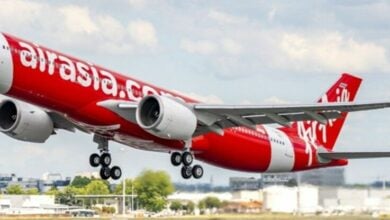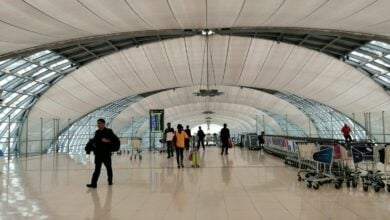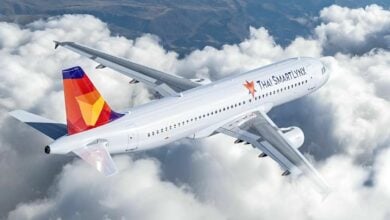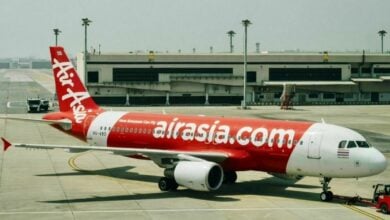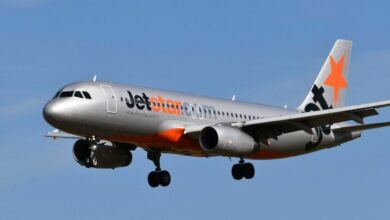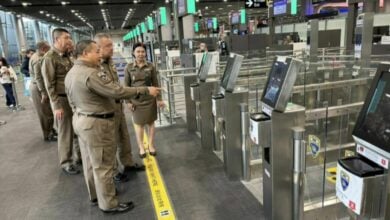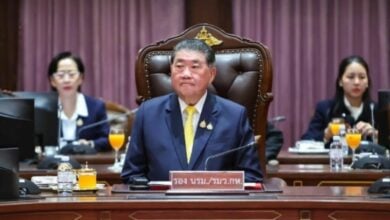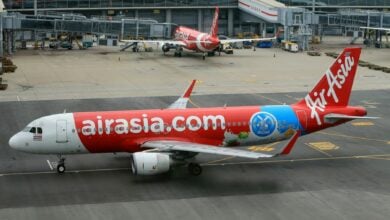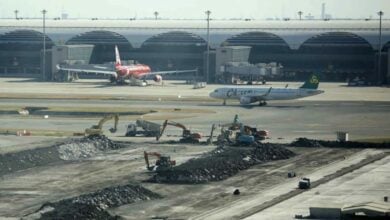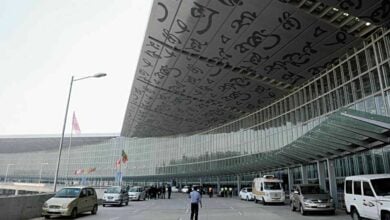World News
Explore the latest global news with The Thaiger’s World News page, your comprehensive source for international updates. We’ve got breaking news, insightful analysis, and exclusive stories from around the globe, covering politics, business, technology, and culture. Stay informed about the world’s most pressing issues, emerging trends, and influential events, as well as updates on travel, lifestyle, and entertainment.
The Thaiger is your go-to platform for staying connected with the ever-changing world we live in. To keep up with the most reliable international news source, subscribe to our newsletter and follow us on social media.
-
 Sponsored
Sponsored Do foreigners get free healthcare in Thailand?
Thailand’s healthcare system is well-regarded across Southeast Asia, with options ranging from public hospitals to world-class private facilities. But when it comes to foreign residents or tourists, healthcare access isn’t as straightforward. So, do foreigners get free healthcare in Thailand?...
-

Indian passengers turn Thai AirAsia plane into party zone (video)
A flight to Thailand turned into a scene of mid-air mayhem, sparking outrage online after a viral video showcased the unruly behaviour of Indian passengers. Shared by Ankit Kumar, a content creator aboard the Thai AirAsia flight, the footage reveals groups of Indian men standing in the aisle, chatting loudly, snacking, and blatantly ignoring air hostesses’ repeated requests to return…
-

Flight fright: Passenger tries to open exit on THAI flight from Taiwan (video)
A tense incident unfolded on a Thai Airways flight when a Thai worker returning from Taiwan experienced hallucinations and attempted to open the emergency exit mid-flight. Quick-thinking passengers managed to subdue and restrain him, averting potential disaster. A TikTok user, @yao1926.new who was on the flight, shared a video capturing the dramatic event. The user recounted that on the flight…
-

Myanmar cops rescue kidnapped businessman after deadly shootout
Police in Myanmar successfully rescued a 78 year old businessman who had been abducted outside a currency exchange shop. The dramatic operation resulted in a shootout, leaving six suspects dead and significant evidence uncovered. The victim, who had not eaten since his capture, was found safe. The incident occurred at 6am on December 13, when Yan Tin Chan was kidnapped…
-

Thai film ‘Grandma’ shortlisted for 97th Academy Awards
A significant milestone for Thai cinema unfolded yesterday, December 18 as Thai film studio GDH announced that How to Make Millions Before Grandma Dies has been shortlisted for the 97th Academy Awards in the Best International Feature Film category. The film, directed by Pat Boonnitipat and penned by screenwriter Ped Thodsapon, stands out among 85 international submissions, marking a first…
-

Death penalty sought for Korean murderer in Pattaya, Thailand
Prosecutors in South Korea are demanding the death penalty for two men accused of the chilling murder of a Korean tourist in Thailand, an act described as both premeditated and brutal. Court officials confirmed the request today, as grisly details of the crime emerged. The suspects, 39 year old Kim Hyeong Gwon and a 27 year old surnamed Lee, face…
-

Thai AirAsia X expands Bangkok-Delhi route with 4 weekly flights
Budget travellers, rejoice! Thai AirAsia X is ramping up its services, connecting Bangkok and Delhi with four weekly flights starting January 15, 2025. The move comes as the airline capitalises on surging demand from Indian flyers, driven by visa-free travel perks and enhanced connectivity. The carrier, which operates A330 planes, marked its return to the Indian capital on Sunday, December…
-

Polish man sentenced for trafficking £100k of cannabis into UK
A young Polish man in the United Kingdom was sentenced to two years in a young offenders institution after pleading guilty to trafficking almost £100,000 (4.3 million baht) of cannabis into Newcastle International Airport in the North-East of England. He claimed he was coerced into the illicit operation by a threatening organised crime syndicate. On August 30, Border Force officials…
-

Thai entertainment shines at Singapore’s Asia TV Forum 2024
Thailand’s entertainment industry has made a dazzling splash at the Asia TV Forum & Market 2024 (ATF) in Singapore, proving its growing appeal on the global stage. With a vibrant showcase of films, dramas, and BL series, Thai producers left international buyers and collaborators eager for more. Held from December 3 to 6 at Marina Bay Sands, the event saw…
-

Syrian woman and Afghan men nabbed in Phuket passport scam
Phuket International Airport turned into a hotspot for international intrigue on Monday as immigration officers caught three travellers attempting to pass through with forged passports. In the first bust, a 27 year old Syrian woman, whose name was withheld, was apprehended trying to enter Thailand with a fake Italian passport. The arrest occurred in the international arrivals hall at about…
-

Airline industry poised to surpass US$1 trillion despite delays
The global airline industry anticipates surpassing US$1 trillion in revenue due to record passenger numbers, despite facing significant challenges in acquiring new aircraft, according to the International Air Transport Association (IATA). Issues with Boeing and Airbus have caused delivery delays, impeding airlines‘ ability to upgrade their fleets with more efficient planes that could reduce fuel expenses while accommodating increased passenger…
-

Hong Kong hotel bills pile up: Tourism takes a hit amid dollar drama
As Hong Kong’s hospitality sector braces for the new year, a perfect storm of challenges threatens to sour the city’s tourist appeal. With a new lodging tax set to dent visitors’ wallets and geopolitical tensions on the rise, thanks to Donald Trump’s upcoming presidency, the city’s once-thriving tourist industry could face an uphill battle. From January, a 3% hotel guest…
-

Thailand seeks US direct flights amid airline hesitance
The Tourism Authority of Thailand (TAT) is actively working to initiate direct flights from the United States to Thailand, as local Thai airlines remain hesitant to establish these routes. This move follows the anticipated lifting of restrictions by aviation regulators next year. The US Federal Aviation Administration (FAA) recently provided a positive assessment of Thailand’s aviation safety standards. The Transport…
-

‘Fast Eddie’ Davenport fights closure of 652 million baht London mansion amid controversy
Notorious fraudster Edward “Fast Eddie” Davenport has returned to the UK from Thailand to contest a police order to shut down his £15 million (652 million baht) in Marylebone, London. The 58 year old, known for hosting raucous sex parties at the lavish property, is challenging a closure notice issued by the Metropolitan Police under the Anti-Social Behaviour, Crime and…
-

Ready for takeoff: Thai SmartLynx poised to shake up Thai skies
Thailand’s aviation industry is about to soar with the arrival of Thai SmartLynx Airlines, set to launch operations in January 2025. Its inaugural aircraft, an Airbus A320, is currently undergoing meticulous engine inspections in Bali, preparing to meet the country’s growing demand for air travel as tourism rebounds. With tourism projected to bring in 40 million visitors in 2025, Thai…
-

Airbus partnership aims to turn Thailand into aviation powerhouse
Thailand is gearing up to soar as the region’s top aviation hub, thanks to a high-flying partnership with European aerospace giant Airbus. In a bid to revolutionise the nation’s aviation infrastructure and safety standards, Transport Minister Suriya Jungrungreangkit met Airbus Asia-Pacific president Anand Stanley in Bangkok yesterday, December 3, to map out ambitious plans. The partnership focuses on transforming Thailand…
-

Grounded: Thai AirAsia denies ticket fraud, blames airline app
Thai AirAsia denied allegations of ticket fraud, stating that the issue stemmed from its application, which was managed by its supplier. The alleged ticket fraud came to light after the local news Facebook page, Esor News, shared the story on December 1. The page posted the following message: “Abscess pops! A renowned airline deceives clients, offering ticket reservations and collecting payments…
-

Port, theme park, and F1 dreams: Tycoon’s vision for Jakarta
A Formula 1 race in Jakarta? That’s just one of the audacious ideas from Sugianto Kusuma, one of Indonesia’s wealthiest tycoons, as he transforms a former slum into a multibillion-dollar metropolis. From a bustling port to luxury hotels, the ambitious project is aiming to put North Jakarta on the global map. Kusuma, better known locally as Aguan, is spearheading the…
-

Rice and shine: Parboiled prices soar as global markets heat up
Global rice markets are heating up as prices for parboiled rice surged this week, driven by robust demand in major export hubs India and Thailand. After three weeks of stability, Indian and Thai exporters are now cashing in on renewed interest, while Vietnamese traders grapple with stagnant sales. India, the world’s largest rice exporter, saw its 5% broken parboiled rice…
-

Jetstar flight to Phuket returns to Sydney after wheel damage
A Jetstar flight bound for the sunny shores of Phuket took an unexpected detour back to Sydney after a mechanical mishap forced pilots to prioritise safety. The JQ27 flight landed safely at Sydney Airport on Wednesday afternoon, November 27, following reports of a damaged wheel during take-off. Jetstar’s spokesperson assured passengers the situation was handled expertly. “Our flight from Sydney…
-

AOT confirms facial recognition for international flights
Airports of Thailand Plc (AOT) yesterday announced that the state-owned enterprise will implement facial recognition services at six major airports for international flights starting December 1. The biometrics-based system will be deployed at Chiang Mai, Chiang Rai, Don Mueang, Hat Yai, Phuket, and Suvarnabhumi airports. AOT anticipates the new technology will significantly streamline the passenger experience, reducing checkpoint processing time…
-

Sink or swim: Thai submarine deal stuck in murky waters
Thailand’s long-delayed submarine deal with China remains in troubled waters as Defence Minister Phumtham Wechayachai admits he’s yet to make a call on the contentious project. “The project’s fate is still not clear because I have not yet studied it. I’ll decide after studying it.” The 13.5 billion baht procurement of an S26T Yuan-class submarine has been stalled amid political…
-

New Mumbai-Bangkok flights ready for take-off in late December
Thailand’s friendly skies just got friendlier! Vietjet Thailand is set to connect two vibrant hubs, Mumbai and Bangkok, with its inaugural direct service starting December 23. This new route promises seamless travel for tourists and business passengers alike, sparking a boost in tourism, trade, and cultural exchange between the two bustling cities. Initially, the service will operate daily. Flight VZ761…
-

Thai airlines offer 30% discounts on 50,000 seats for new year
The Thai Ministry of Transport announced a new year’s gift for travellers, addressing the issue of expensive flight tickets by collaborating with airlines to offer a 30% discount on 50,000 seats during the new year holiday period. Deputy Prime Minister and Minister of Transport, Suriya Jungrungreangkit yesterday, November 27, disclosed that a meeting was convened with the Thai Airline Association.…
-

Netflix star smuggles her way out of jail despite £150k cannabis bust (video)
In a sensational twist right out of a crime thriller, Netflix star Olga Bednarska incredibly escaped a long prison sentence despite being nabbed at Manchester Airport smuggling cannabis worth £150,000 (6.75 million baht) through customs. The star of Netflix’s hit reality show Too Hot to Handle, found herself entangled in a scandalous drug-smuggling affair after Manchester Airport customs officers intercepted…
-

AoT to compensate residents 12 billion baht for airport noise
Airports of Thailand (AoT) is set to distribute 12 billion baht as compensation to residents affected by noise pollution from the third runway at Suvarnabhumi Airport. This decision follows a meeting held on Monday, November 25 involving the AoT, the Transport Ministry, and the Bangkok Metropolitan Administration (BMA) to address residents’ demands for relief from the noise generated by aircraft…
-

Eight arrested in hostel horror after 6 tourists die in Laos
Police arrested eight members of staff at a backpacker hostel in Laos after the venue became the centre of a suspected mass methanol poisoning that claimed the lives of six foreign tourists. Eight staff members from the Nana Backpacker Hostel in Vang Vieng, reportedly all Vietnamese nationals, are facing questioning as the investigation unfolds. Australian teenagers Bianca Jones and Holly…
-

India launches new flights to Bangkok and Kuala Lumpur this winter
International travel from India’s Kolkata is in for a major lift this winter, as two major airlines ramp up connections to Southeast Asia. With Thai Lion Air launching four weekly flights to Bangkok and Malaysia Airlines resuming its pre-pandemic route to Kuala Lumpur, Kolkata travellers are set for a world of new options. Starting December 16, Thai Lion Air, a…
-

Thai man arrested at Bangkok airport for baht luxury bag scam
Police at Suvarnabhumi Airport apprehended a 36 year old Thai man attempting to flee the country after allegedly scamming several individuals out of over 100 million baht through the sale of counterfeit luxury brand bags. Thanawat’s arrest was executed by immigration police at the airport in Bang Phli, Samut Prakan, at 5pm yesterday, November 25. The arrest warrant had been…
-

Boy 7 killed by Thai mother rocks quiet Welsh town
Police in Wales reported that the death of a 7 year old boy at the hands of his Thai mother has rocked the quiet Welsh town of Haverfordwest. Seven year old Louis Linse was found dead in his bed, his life tragically cut short by his mother. Thai-born Papaipit Linse admitted to manslaughter by diminished responsibility, a truth that unravels…
Broke? Find employment in Southeast Asia with JobCute Thailand and SmartJob Indonesia. Rich? Invest in real estate across Asia with FazWaz Property Group or get out on a yacht anywhere with Boatcrowd. Even book medical procedures worldwide with MyMediTravel, all powered by DB Ventures.






